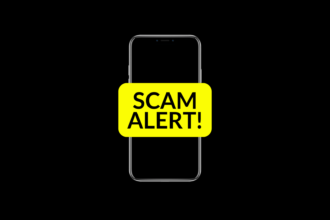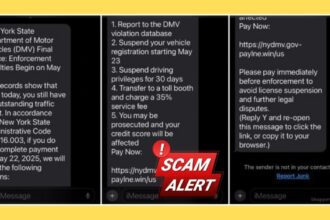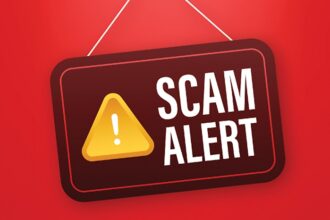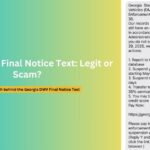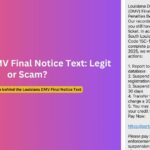Urgent Warning: A sophisticated Utah DMV Final Notice Text Scam is sweeping across the Beehive State, targeting unsuspecting residents with fraudulent messages claiming to be from the “Utah State Department of Motor Vehicles.” These deceptive texts threaten immediate license suspension for alleged unpaid traffic tickets and direct victims to malicious websites designed to steal personal and financial information.
The Utah Driver License Division and state law enforcement agencies are urging residents to remain vigilant as this coordinated phishing campaign affects thousands of Utah residents across all counties. These professional-looking messages exploit people’s fear of government penalties and create artificial urgency to pressure victims into clicking dangerous links and providing sensitive information to cybercriminals.
Overview of the Utah DMV Outstanding Traffic Tickets Text Scam
The Utah State Department of Motor Vehicles Outstanding Traffic Ticket Text scam represents a highly organized “smishing” (SMS phishing) operation specifically targeting Utah residents through fake government communications. Scammers are mass-distributing fraudulent text messages that falsely claim to be from Utah’s motor vehicle department, creating panic about supposed unpaid traffic violations that could result in immediate license suspension.
This sophisticated fraud campaign is particularly dangerous because it mimics official government communications while using urgent language and fake legal references to establish credibility. The messages reference non-existent Utah administrative codes and threaten severe consequences including license revocation, vehicle registration cancellation, credit score damage, and legal prosecution—all designed to pressure victims into immediate action without verification.
The Utah Driver License Division has confirmed that they never send unsolicited text messages requesting payment or personal information. All legitimate communications from Utah’s motor vehicle department are conducted through official postal mail, verified online accounts, or in-person visits to Driver License Division offices.
This scam is part of a coordinated nationwide campaign affecting multiple states, with cybercriminals adapting identical templates for different state motor vehicle departments while targeting residents through phone number databases and area code targeting systems.
How the Utah DMV Final Notice Text Scam Operates
The Utah DMV scam follows a sophisticated multi-stage process designed to maximize victim compliance and data harvesting:
Stage 1: Targeted Mass Distribution
Cybercriminals use automated messaging systems to send thousands of identical fraudulent messages to Utah phone numbers, particularly targeting area codes 385 and 801. They acquire these numbers through various illegal methods including data breaches, purchased contact lists from compromised marketing databases, social media harvesting, and systematic number generation targeting Utah’s telecommunications infrastructure.
Stage 2: Psychological Manipulation
The fraudulent messages employ advanced psychological manipulation techniques, creating immediate fear through threats of license suspension, legal prosecution, and financial penalties. By establishing artificial deadlines (typically 24-48 hours), scammers prevent victims from taking time to verify the legitimacy of the claims or consult with family members or authorities.
Stage 3: False Authority Establishment
The messages use official-sounding language, reference fake Utah administrative codes, and claim government authority to establish credibility. They exploit people’s natural respect for law enforcement and government agencies while using specific Utah references to increase believability among local residents.
Stage 4: Data Harvesting and Financial Exploitation
When victims click the malicious links, they’re redirected to sophisticated fake websites that closely mimic legitimate government portals. These sites are designed to steal comprehensive personal information including Social Security numbers, driver’s license details, banking information, credit card data, and other sensitive financial details.
Stage 5: Extended Criminal Exploitation
Once scammers obtain personal information, they can engage in extended criminal activities including identity theft, unauthorized financial transactions, selling personal data on criminal marketplaces, and continued targeting of victims with additional sophisticated scams and fraud attempts.
Fake Text Message Patterns and Examples
Standard Fake Utah DMV Text Message Example
Example 1: Typical Final Notice Example
Utah State Department of Motor Vehicles (DMV) Final Notice: Enforcement Penalties Begin on June 6.
Our records show that as of today, you still have an outstanding traffic ticket. In accordance with Georgia State Administrative Code 15C-16.003, if you do not complete payment by June 5, 2025, we will take the following actions:
1. Report to the DMV violation database
2. Suspend your vehicle registration starting June 5
3. Suspend driving privileges for 30 days
4. Transfer to a toll booth and charge a 35% service fee
5. You may be prosecuted and your credit score will be affected Pay Now:
https://utah.gov-ybbr.xin/pay
Please pay immediately before enforcement to avoid license suspension and further legal disputes. (Reply Y and re-open this message to click the link, or copy it to your browser.)
Example 2: Urgent Payment Demand Variation
CRITICAL: Utah Driver License Division Final Warning
Your driving privileges will be SUSPENDED in 24 hours due to unpaid citation #UT2025-8421.
Immediate action required: https://utah-dld-payment.net/emergency
Failure to respond will result in license revocation and additional $300 penalty fees.
Example 3: Vehicle Registration Threat
Utah State Tax Commission Notice:
Outstanding vehicle registration fees detected. Pay within 12 hours or face:
– Immediate registration suspension
– $250 reinstatement fee
– Potential vehicle impoundment
Secure payment portal: https://utah-registration-emergency.com/pay-now
Common Scam Variations and Adaptations
Scammers frequently modify their messages to avoid detection algorithms and increase effectiveness. Common variations include different penalty amounts, varying deadline timeframes, alternative fake website URLs, different sender identification methods, and seasonal adaptations referencing ski season traffic or summer tourism enforcement.
Critical Red Flags to Identify Fraudulent Utah DMV Texts
Sender Identification Warning Signs
- International phone numbers: Messages originating from +63 (Philippines), +44 (United Kingdom), +91 (India), or other non-US country codes
- Email address senders: Texts coming from Gmail, Yahoo, Outlook, or other personal email services rather than official government communications
- Suspicious number patterns: Phone numbers that don’t follow standard US formatting or don’t match Utah’s legitimate area codes
Content and Language Red Flags
- Wrong legal references: Citation of “Georgia State Administrative Code” in Utah-targeted messages (a clear copy-paste error from other state scams)
- Incorrect agency names: Using “Department of Motor Vehicles (DMV)” instead of Utah’s actual “Driver License Division”
- Grammar and spelling errors: Poor sentence construction, missing punctuation, typos, or unprofessional language
- Generic messaging: Lack of specific personal details, actual violation numbers, incident dates, or legitimate case references
- Impossible enforcement procedures: References to “toll booth transfers” or other nonsensical administrative actions
Technical and URL Red Flags
- Non-government domains: Any links not ending in “.utah.gov” or legitimate Utah state domains
- Suspicious URL patterns: Links containing hyphens, random letters, unusual extensions (.xin, .icu, .tk), or obvious misspellings
- Shortened URLs: Use of bit.ly, tinyurl, or other URL shortening services to hide the actual destination
- Link activation instructions: Requests to “Reply Y and re-open” which indicate scammer tactics to bypass security filters
Communication Method Red Flags
- Text message delivery: Legitimate Utah Driver License Division communications are always sent via official postal mail
- Immediate payment demands: Real government agencies provide extended timeframes and multiple official notices
- Artificial urgency: Unrealistic deadlines designed to prevent verification and create panic responses
- No legitimate contact options: Absence of official Utah government phone numbers or addresses for verification
Statewide Scam Campaign Targeting All Utah Cities
Salt Lake County Metropolitan Area Under Attack
Residents throughout Salt Lake City, West Valley City, Sandy, West Jordan, Taylorsville, Murray, Millcreek, Cottonwood Heights, Midvale, and Draper are experiencing high volumes of these Utah DMV Final Notice Text Scam messages, with particular targeting of dense population centers.
Davis County and Northern Utah Affected
The scam has heavily impacted Ogden, Layton, Bountiful, Clearfield, Kaysville, Farmington, and surrounding Davis County communities, with scammers exploiting the region’s commuter population and proximity to major transportation corridors.
Utah County and Provo Area Targeted
Provo, Orem, Spanish Fork, American Fork, Pleasant Grove, Lehi, and surrounding Utah County residents are receiving numerous fraudulent Utah State Department of Motor Vehicles Outstanding Traffic Ticket Text messages, particularly targeting the large student and young professional population.
Weber County and Cache Valley Hit Hard
Logan, Roy, Hooper, North Ogden, and Cache County communities are being specifically targeted by scammers exploiting the region’s agricultural and educational communities, with particular focus on Utah State University students and faculty.
Washington County and Southern Utah Under Siege
St. George, Hurricane, Cedar City, Washington, and surrounding Washington County and Iron County residents are experiencing coordinated waves of these fraudulent messages, with scammers targeting the region’s growing retiree and tourist populations.
Carbon and Emery County Rural Areas Affected
Price, Helper, Castle Dale, and surrounding rural communities in Carbon County and Emery County are not immune from this sophisticated scam operation, with cybercriminals specifically targeting smaller communities that may have limited digital security awareness.
Tooele County and Western Utah Victims
Tooele, Grantsville, Stansbury Park, and surrounding Tooele County residents are receiving significant numbers of these fraudulent DMV text messages, particularly targeting military families and defense industry workers in the region.
Summit County and Park City Targeted
Park City, Heber City, Coalville, and Summit County communities are experiencing elevated scam activity, with criminals exploiting the area’s affluent tourism and recreation industry demographics for maximum financial impact.
How to Protect Yourself from These DMV Text Scams
Immediate Response Protocol
- Never click suspicious links in any text message claiming to be from Utah government agencies
- Do not reply to the message under any circumstances, even to request removal from lists
- Do not call phone numbers provided in suspicious text messages
- Take detailed screenshots of the entire message for evidence and reporting purposes
- Block the sender immediately using your phone’s built-in blocking features
Verification and Authentication Steps
- Use official Utah websites only: Visit dmv.utah.gov directly, never through text message links
- Access legitimate online services: Use official Utah Driver License Division online portals
- Contact Utah DLD directly: Call verified phone numbers from the official state website
- Check official mail: Review any legitimate postal correspondence from Utah state agencies
- Cross-reference multiple sources: Verify any claims through independent official channels
Personal Security Enhancement Measures
- Enable multi-factor authentication on all government and financial online accounts
- Create strong, unique passwords for Utah state online services and portals
- Monitor credit reports regularly for unauthorized activity or new account openings
- Set up account alerts for unusual login attempts, password changes, or suspicious activity
- Limit personal information sharing on social media and public platforms
Family and Community Protection Strategies
- Educate elderly family members about these specific Utah-targeted scam tactics
- Share information widely with friends, neighbors, and community organizations
- Establish verification protocols within families for any urgent payment requests
- Create communication procedures for reporting and discussing suspicious messages
What to Do If You Receive a Fake Utah DMV Final Notice Text
Immediate Actions Required
- Document the scam thoroughly: Take clear, detailed screenshots including sender information and timestamps
- Block the sender: Use your phone’s blocking features to prevent future messages from the same source
- Report as spam: Forward the message to 7726 (SPAM) to alert your cellular carrier
- Delete the message: Remove it from your device after proper documentation and reporting
Official Reporting Procedures
- Utah Attorney General’s Office: Report the scam through their consumer protection fraud reporting system
- Utah Driver License Division: Contact the fraud prevention department to report the incident
- Federal Trade Commission: File comprehensive complaints at reportfraud.ftc.gov
- Internet Crime Complaint Center: Submit detailed reports to ic3.gov for federal investigation
- Local law enforcement: Report to your local police department’s fraud or cybercrime unit
If You Already Clicked the Malicious Link
- Change all passwords immediately for financial accounts, government portals, and email services
- Contact your bank and credit card companies to report potential security breaches
- Run comprehensive security scans on all devices that accessed the malicious link
- Monitor all accounts closely for unauthorized access attempts or suspicious activity
- Consider professional cybersecurity services for ongoing protection and monitoring
If You Provided Personal or Financial Information
- Contact financial institutions immediately to secure accounts and request new cards with different numbers
- Place fraud alerts on credit reports with all three major credit bureaus (Equifax, Experian, TransUnion)
- File identity theft reports with local law enforcement and federal agencies
- Consider comprehensive credit freezes to prevent new account openings
- Document all communications with financial institutions and law enforcement agencies
Frequently Asked Questions (FAQs)
1. Is the Utah DMV Final Notice Outstanding Traffic Ticket Text Legit?
No, these text messages are completely fraudulent and not legitimate communications from any Utah state agency. The Utah Driver License Division does not send payment notices, violation warnings, or any official communications via unsolicited text messages. All legitimate Utah state communications regarding traffic violations, license issues, registration problems, or payment requirements are sent through official postal mail with Utah state letterhead or through verified online account portals. Any text message claiming to be from the “Utah State Department of Motor Vehicles” should be considered suspicious since Utah uses the “Driver License Division” designation, not “DMV.”
2. Does Utah Administrative Code 15C-16.003 Actually Exist?
No, Utah Administrative Code 15C-16.003 does not exist in Utah’s legal framework. This is a completely fictitious legal reference created by scammers to make their fraudulent messages appear more official and credible. Interestingly, many Utah scam messages actually reference “Georgia State Administrative Code 15C-16.003,” which is also fake but reveals that scammers are using copy-paste templates across multiple states without proper customization. Real Utah administrative codes follow the Utah Administrative Code system and can be verified through the Utah Division of Administrative Rules website. The use of non-existent legal codes is a common intimidation tactic used by cybercriminals.
3. Does Utah Driver License Division Send Text Messages for Official Business?
The Utah Driver License Division does not send unsolicited text messages for any official business purposes, including payment notifications, violation alerts, license renewals, registration reminders, or enforcement actions. All legitimate Utah DLD communications are conducted exclusively through official postal mail, verified online accounts accessed through dmv.utah.gov, or in-person interactions at Driver License Division offices. Utah state agencies have strict protocols for official communications and would never request personal information, payments, or immediate action through text messages.
4. What Should I Do if I Already Paid Money Through a Utah DMV Scam Link?
If you’ve already made a payment through a fraudulent Utah DMV scam link, take immediate action to minimize potential damage. Contact your bank or credit card company immediately to report the unauthorized transaction and request a chargeback investigation. Change all online banking passwords and government account passwords immediately. Place fraud alerts on your credit reports with Equifax, Experian, and TransUnion. File reports with the Utah Attorney General’s Office, Federal Trade Commission, and your local police department. Monitor all financial accounts closely for additional unauthorized activity and consider enrolling in professional identity theft protection services for ongoing monitoring.
5. How Do Scammers Obtain Utah Phone Numbers for These Text Attacks?
Scammers acquire Utah phone numbers through multiple illegal and unethical methods including purchasing contact databases from compromised marketing companies, exploiting data breaches from various businesses and organizations, using automated number generation systems specifically targeting Utah area codes (385 and 801), harvesting numbers from social media profiles and public directories, acquiring numbers from previous successful scam operations, and using specialized software to systematically generate and test phone numbers across Utah’s telecommunications infrastructure. They may also obtain numbers through phishing attacks on legitimate Utah businesses or through criminal networks that specialize in personal data trafficking.
Conclusion
The Utah DMV Final Notice Text Scam represents a serious and growing threat to residents across the Beehive State. These sophisticated phishing attacks exploit our natural respect for government authority and fear of legal consequences to steal personal information and financial resources from hardworking Utah families. By understanding the warning signs, verification procedures, and proper response protocols outlined in this comprehensive guide, Utah residents can effectively protect themselves and their communities from becoming victims of these cybercriminals.
Remember that the legitimate Utah Driver License Division will never contact you through unsolicited text messages demanding immediate payment or threatening instant license suspension. When receiving any suspicious government-related communications, always verify independently through official Utah state websites and verified phone numbers before taking any action.
Protecting our community requires collective awareness and vigilance. Share this critical information with family members, friends, neighbors, and colleagues throughout Utah, particularly elderly relatives who may be especially vulnerable to these sophisticated fraud attempts. Report all suspicious messages to appropriate state and federal authorities to help law enforcement agencies track down and prosecute these criminal operations.
By staying informed about evolving cybercriminal tactics and maintaining healthy skepticism about urgent payment demands, Utah residents can significantly reduce their risk of falling victim to these fraudulent schemes. The key to defeating these scams lies in education, community cooperation, and consistent verification of all government communications through official channels.
Stay protected against the latest fraud alerts and cybersecurity threats with ShoppersVila.com – your trusted resource for consumer protection tips and digital security guidance to keep Utah families safe from emerging online scams and financial fraud.

























